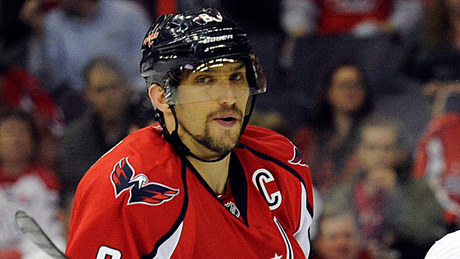
May 15, 2013
Washington Capitals captain and star forward Alex Ovechkin is used to being in the headlines for the right seasons. The 27-year old is arguably the best pure goal scorer in the modern day NHL and he has been one of the faces of the league since it returned from the 2004-05 lockout. However, the past few days have seen Ovechkin hit the headlines for all the wrong reasons. He has chosen to spout out conspiracy theories and confused post-series analysis rather than do what he clearly should do: take responsibility.
The Capitals took an early 2-0 lead in their first round 2013 NHL playoff series against the New York Rangers and also led 3-2, but ultimately fell in seven games. Game 7 was at the Verizon Center, but the Rangers seized the occasion finishing the series off with a 5-0 blowout.
One of the main story lines for the series was the captain’s performance. Ovechkin had scored at more than a goal per game over the last 20 games of the regular season to lead a tremendous Washington run to the playoffs and Southeast division crown. However, after tallying a goal and an assist in the opening two games, he was held off the score-sheet altogether during the final five games.
It would seem relatively simple. Ovechkin needs to score and lead this offense for the Capitals to be successful. Washington made the playoffs on the back of the efforts of one of the elite scorers. His failure to tally in the postseason doesn’t remove culpability for the rest of the line-up, but it does mean that they were being asked to do more than normal against a New York team that is strong defensively and against one of the NHL’s best goaltenders.
Instead of simply accepting blame; it appears that Ovechkin has opted for a different approach and it suggests that the pressure of having not enjoyed any team success past the regular season is finally getting to the superstar. His initial reaction was to suggest a wild conspiracy theory based upon the referees manipulating Game 6 to ensure that a Game 7 happened for ‘ratings’. He then provided an illuminating statement suggesting simultaneously that ‘one guy cannot win a championship’ and that New York goaltender Henrik Lundqvist had single-handedly stopped the Capitals. He capped it all off by talking about an injury he has been dealing with. Apparently that injury isn’t enough to prevent him competing at the World Championships for Russia though.
These World Championships will mark Ovechkin’s 10th appearance in 11 seasons. A clear sign that he hasn’t been making many long trips through the postseason rounds. The reality is that matching regular season offensive production requires serious elevation of performance. Ovechkin hasn’t been able to do that.
The two tables below show the career regular season and postseason average goal and point totals for Alex Ovechkin, Sidney Crosby and Evgeni Malkin. All three have pretty impressive numbers across the board and all three will be remembered among the very best offensive players of their era. However, the tables clearly show that while a slight drop in rate of production is standard (Malkin actually has pretty similar totals in both regular season and playoff hockey), Ovechkin’s drop off is far more significant in the comparison. In fact, his drop off in production is more than double Crosby’s. That drop off is a huge problem for both Ovechkin and the Capitals.
|
Regular Season Goal Totals |
R/S per Game |
Playoff Goal Totals |
P/O per Game |
Difference |
|
| Ovechkin |
371 goals in 601 games |
0.62 |
31 goals in 58 games |
0.53 |
-0.09 |
| Crosby |
238 goals in 470 games |
0.51 |
36 goals in 74 games |
0.49 |
-0.02 |
| Malkin |
217 goals in 458 games |
0.47 |
35 goals in 75 games |
0.47 |
0.00 |
|
Regular Season PTS Totals |
R/S per Game |
Playoff Goal Totals |
P/O per Game |
Difference |
|
|
Ovechkin |
735 points in 601 games |
1.22 |
61 points in 58 games |
1.05 |
-0.17 |
|
Crosby |
665 points in 470 games |
1.41 |
99 points in 74 games |
1.34 |
-0.07 |
|
Malkin |
560 points in 458 games |
1.22 |
94 points in 75 games |
1.25 |
+0.03 |
This isn’t about saying that Alex Ovechkin is a bad player or about suggesting Crosby and Malkin are better. There are obviously other factors at work here. However, it seems pretty clear that Pittsburgh’s greater playoff success over the past five seasons can be directly related to the fact that their offensive superstars have pretty much maintained their level of production in the playoffs. Ovechkin hasn’t done that.
‘The Great 8’ has instead faltered. One goal and one assist in seven games is not going to get it done for Washington. He now has just 11 points in 21 games over the past two seasons. He simply has not performed and it is a problem if this franchise wants to progress.
There’s no reason to believe that Ovechkin cannot be successful in the playoffs or to believe that Washington can’t build a decent team around him. However, it is clear that he needs to start standing up and accepting responsibility for his play and his production. There has been no evidence of that in the aftermath of the Capitals’ latest first round exit.


